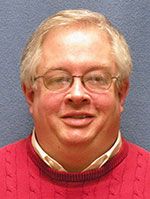Reflection / Sean Gallagher
Faith can be a support to achieve equality for all under the law
 Many Catholics and other people of faith were encouraged when President Donald J. Trump introduced Judge Brett Kavanaugh on July 9 as his nominee to succeed the retiring Justice Anthony Kennedy on the U.S. Supreme Court.
Many Catholics and other people of faith were encouraged when President Donald J. Trump introduced Judge Brett Kavanaugh on July 9 as his nominee to succeed the retiring Justice Anthony Kennedy on the U.S. Supreme Court.
Kavanaugh takes his Catholic faith seriously. In his remarks after the president announced him as his nominee, Kavanaugh said that he uses as a guide for his life the motto of the Jesuit boys high school from which he graduated, “Men for others.”
Today, he does this by serving meals to the homeless in Washington in a Catholic Charities program. He proclaims the word of God as a lector during Mass in his parish. He also seeks to pass on the lessons of faith to others through mentoring, teaching and serving as a Catholic Youth Organization basketball coach for teams on which his two daughters are players.
More broadly, Kavanaugh has been a “man for others” in his years dedicated to public service as a legal professional. He is a good man seeking holiness. We, as Catholics in America, can be grateful for that.
We should want our judges to be good people seeking holiness. But we should also want them to be good judges seeking to be faithful to the law and the Constitution. And while people of various faiths or no faith at all can be good judges in this way, the Judeo‑Christian tradition gives support to these principles.
God gave the Hebrew people his law through Moses on Mount Sinai. Unlike other peoples of that time who were ruled by the capricious will of self-interested strong men, the Hebrews were ruled by God’s law, which applied equally to everyone.
The most fundamental aspects of that law are timeless and relevant to people in all times and places. They are what subsequent philosophers and theologians have called the “natural law” and are, in part, enshrined in the Ten Commandments.
These are laws reflective of the nature of humanity and of the universe as a whole created by God. In his mercy, he revealed them to us more clearly in the law he gave to Moses so that, in guiding our lives by them with the help of his grace, we can achieve some degree of happiness in this life and experience infinite happiness in the next.
The founders of the United States were diverse in the faith they professed. But in framing the Constitution, they were united in believing that the citizens of their new country should be ruled equally by law and not the tyrants from which many of those who settled the 13 colonies had sought to escape.
While not based in the specific teachings of one faith community or another, the laws of the United States in some important ways reflect the natural law that applies to everyone equally. When judges seek to be faithful to the Constitution and our country’s laws as they are written, they serve all people well and do not favor one group over another. By his judicial track record, Kavanaugh would appear to be just such a judge.
Some laws may need to be changed so that all people may be treated more fairly in our society. The place for that to happen, though, is through the democratic process set up by our Constitution and not in our courts. Let legislators who represent those who elected them work out the text of our laws, and judges simply be faithful to the laws as they were written.
All of us who are Christians can further equality under the law by seeking to be fair to everyone we meet and in advocating for laws that are fair to everyone.
(Sean Gallagher is a reporter for The Criterion.) †
 Many Catholics and other people of faith were encouraged when President Donald J. Trump introduced Judge Brett Kavanaugh on July 9 as his nominee to succeed the retiring Justice Anthony Kennedy on the U.S. Supreme Court.
Many Catholics and other people of faith were encouraged when President Donald J. Trump introduced Judge Brett Kavanaugh on July 9 as his nominee to succeed the retiring Justice Anthony Kennedy on the U.S. Supreme Court.